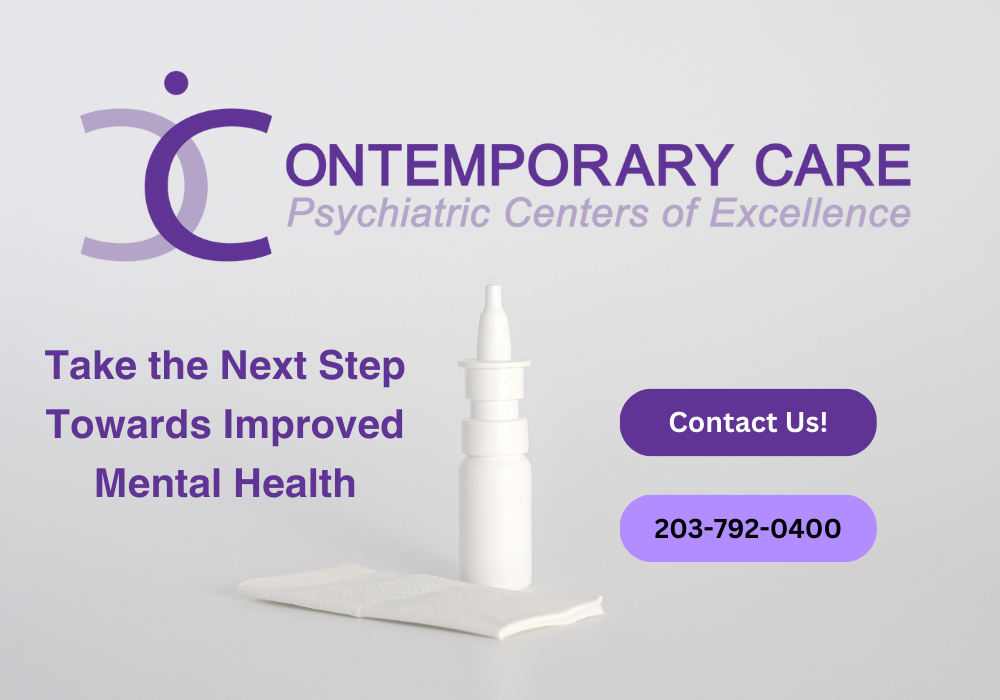Esketamine nasal spray represents a significant breakthrough in psychiatry for those battling treatment-resistant depression. It’s a beacon of hope for individuals who didn’t get results with traditional therapies. Grasping the treatment frequency of esketamine is essential for its effective use and achieving the best possible outcomes.
Understanding Esketamine Nasal Spray for Depression
The FDA has approved esketamine nasal spray for patients suffering from treatment-resistant depression (TRD) and major depressive disorder (MDD) with acute and suicidal thoughts. This endorsement highlights its efficacy in scenarios where other treatments might have fallen short.
Unlike traditional antidepressants that primarily influence serotonin, dopamine, or norepinephrine, esketamine nasal spray for anxiety works rapidly by targeting glutamate, a different neurotransmitter. This unique action can alleviate symptoms within hours or days, significantly faster than the two hours usual weeks seen with conventional treatments.
Mechanism of Action
Esketamine operates by interacting with glutamate receptors in the brain. It specifically binds to NMDA receptors, which increases glutamate release from brain cells and fosters new neural pathways, potentially easing depression symptoms swiftly. This approach is distinct from that of traditional antidepressants, making esketamine nasal spray for depression a vital option for some patients who haven’t responded to other treatments.
Initial Phase of Treatment
Patients typically attend sessions twice a week for four weeks. Also, schedules let doctors keep an eye on them closely early on. Therefore, adjustments are made if needed. The aim then is to mitigate and treat depressive symptoms in adults more quickly. Further, this helps patients feel better quickly. More so frequent sessions are key in the beginning phase. Nevertheless, once improvement started, adjustments to the schedule could happen. Yet at the start, close monitoring remained crucial to catch issues early.
Patient Experience
Patients receive care specifically tailored to their needs in the initial treatment month. Sessions are held in a supportive and empathetic environment, encouraging active participation in the treatment process. These sessions include detailed evaluations and continuous assessments to track progress and address any arising concerns.
Our team pays close attention to each patient’s reaction to the treatment, adjusting dosages as needed to optimize effectiveness and minimize side effects. This careful, proactive approach ensures the best outcomes for our patients, emphasizing safety and comfort.
Maintenance Phase
The transition from the induction oral antidepressant to the maintenance phase oral antidepressants is based on noticeable improvements in depressive symptoms and achieving mental health stability. Initially, treatment sessions are scheduled once a week, but adjustments are made depending on each patient’s response following symptoms.
Long-Term Management
During the maintenance phase of continued treatment, the goals include preventing symptom recurrence and maintaining the progress achieved. Regular check-ins and assessments ensure ongoing success and address new challenges. We’re committed to supporting each patient’s continued well-being and improving their quality of life.
Factors Influencing Treatment Frequency
The frequency of esketamine treatments can vary greatly depending on individual circumstances. These include the severity of bipolar disorder or depression, overall health, and the presence of other medical conditions.
Individual Variability:
- Everyone responds to esketamine nasal spray for anxiety differently.
- Treatment frequency is tailored based on individual needs and health status.
Adjustments in Treatment Schedule:
- We may alter the frequency of sessions based on how patients respond to treatment.
- If symptoms improve or stabilize, the frequency of sessions might be reduced.
- If symptoms persist or worsen, more frequent treatment may be necessary.
Patient Testimonials
Hearing from others who have adhered to their treatment plans can provide encouragement and motivation. These stories often highlight significant improvements in well-being, and consistent treatment can have a positive impact.
Potential Challenges and Solutions
Treatment journeys can sometimes be challenging, but effective strategies to manage and treat depression can overcome these hurdles.
Common Challenges
- Stigma and discrimination related to mental health can affect one’s willingness to seek help.
- Manage regular appointments amidst a busy schedule.
- The emotional strain of dealing with depression and the treatment process.
Strategies to Overcome Challenges
- Build a support network of friends, family, or groups.
- Educate oneself about the condition and treatment options.
- Prioritize self-care and maintain an open dialogue with healthcare providers.
Optimal Treatment Approaches
Successfully managing depression requires identifying the most effective treatment strategies. In this section, we discuss approaches to other antidepressants that can enhance the benefits of esketamine therapy.
Psychotherapy Integration:
Integrating esketamine treatment with psychotherapy, such as cognitive-behavioral therapy (CBT) or interpersonal therapy, significantly boosts the overall effectiveness of antidepressant medicines in the regimen. These therapies delve into the psychological underpinnings of depression and equip patients with essential coping mechanisms for enduring relief.
Lifestyle Modifications:
Adopting lifestyle changes plays a crucial role in complementing esketamine therapy. Regular physical activity, a balanced diet, sufficient sleep, and effective stress management can profoundly influence mood and overall health. These positive lifestyle habits help reinforce the therapeutic effects of esketamine nasal spray for depression, leading to better outcomes.
Medication Management:
For some individuals, particularly those with severe or treatment-resistant depression, adding traditional antidepressants to esketamine therapy may be advantageous. Collaborating closely with healthcare providers to fine-tune medication regimens ensures a comprehensive approach to symptom management, enhancing the overall effectiveness of the treatment.
Mindfulness and Relaxation Techniques:
Incorporating techniques including mindfulness meditation, yoga, and deep breathing exercises can significantly enhance the benefits of esketamine nasal spray for anxiety. These techniques not only promote relaxation and stress reduction but also bolster emotional resilience, enabling individuals to manage depressive symptoms more effectively and maintain mental health stability.
Social Support Networks:
Engagement with supportive social networks—including friends, family, support groups, and online communities—provides crucial emotional support and motivation throughout the treatment journey. Cultivating these relationships helps to create a sense of belonging and can mitigate the isolation often associated with depression.
Potential Risks and Safety Measures
Understanding the risks associated with esketamine treatment is crucial for ensuring patient safety and well-being.
Risk of Side Effects
While esketamine nasal spray for depression is generally well-tolerated, some patients may experience side effects such as dizziness, dissociation, nausea, or increased blood pressure. These effects are usually mild and transient, but patients need to be aware and communicate any concerns to their healthcare provider. Promptly addressing these reactions helps manage and mitigate them effectively.
Risk of Abuse and Dependence
Given its chemical similarities to ketamine, there is a potential risk of abuse and dependence on esketamine. Healthcare providers are vigilant in screening patients for a history of substance abuse and closely monitor for any signs of misuse throughout the treatment course. Maintaining open communication about substance use is critical to safely managing and administering esketamine treatment.
Safety Measures
Healthcare providers follow stringent protocols when administering esketamine, including thorough patient evaluations, monitoring vital signs during treatment, and providing a supportive environment during sessions. Providers also undergo specialized training to manage and implement esketamine nasal spray for depression safely and effectively.
Patient Education
Educating patients about esketamine is a key aspect of the treatment process. Detailed discussions include potential risks, benefits, and necessary precautions while undergoing treatment. This empowers patients to make informed decisions about their treatment plans.
Individualized Treatment Plans
Each patient’s treatment plan is custom-made to fit their needs and circumstances. The medical history is taken into account. Also, current medications are considered too. Further, specific goals for treatment play a role. This approach tailors itself to each person. More so, it helps reduce risks they might face otherwise. Yet the method isn’t just about safety. It also aims at boosting how well treatments work for them individually. Nevertheless, one can see that every step matters in this process. Therefore, such personalization enhances the overall effectiveness of the treatments given out
Long-Term Outcomes
Evaluating the long-risk evaluation and mitigation-term effects of esketamine treatment is essential for clinical studies and for understanding its efficacy and sustainability in clinical trials.
Positive Effects
Many patients experience sustained improvements in their depressive symptoms in young adults, including reduced frequency and severity of depressive episodes. This can lead to enhanced daily functioning and a better quality of life.
Prevention of Relapse
Ongoing treatment and support are vital for maintaining the benefits achieved with esketamine. Continual engagement with healthcare services helps to prevent relapse and ensures long-term stability in mental health.
Enhanced Quality of Life
Patients often report significant improvements in overall well-being, including increased energy, better sleep, increased risk, and improved social interactions, which contribute to a fulfilling life.
Monitoring and Follow-up
Regular monitoring and follow-up visits are crucial for assessing the treatment’s impact and making necessary adjustments. This ongoing, evaluation and mitigation strategy ensures that the treatment remains effective and that any emerging issues are promptly addressed.
Patient-Centered Care
A patient-centered approach is fundamental to successful long-term treatment. Healthcare providers can foster a supportive and effective treatment environment by tailoring strategies to individual needs and preferences.
Take the Next Step Towards Improved Mental Health with Contemporary Care Centers!
Discover how contemporary care centers can support your journey to better mental health through personalized and cutting-edge treatments.
Personalized Treatment Plans
At Contemporary Care Centers, each treatment plan is carefully designed to meet the unique needs and goals of the individual. Our team of specialists collaborates closely with patients to develop comprehensive strategies that address specific symptoms and challenges.
Cutting-Edge Therapies
Our centers are equipped with the latest advancements in mental health care, including esketamine treatments. These innovative therapies are selected to enhance symptom relief and are administered under the guidance of experienced healthcare professionals.
Expert Guidance and Support
Our compassionate team is dedicated to supporting your mental health journey every step of the way. From the initial consultation to ongoing treatment sessions, you’ll receive expert guidance and personalized support designed to help you navigate your path to recovery confidently.
Accessible and Convenient Care
With multiple locations and flexible scheduling, Contemporary Care Centers have access to quality mental health services. We understand the challenges of modern life and strive to accommodate your needs, ensuring you can prioritize your mental health without added stress.

Start Your Journey Today!
Schedule a consultation at Contemporary Care Centers and take the first step towards a healthier, happier you. Whether you’re dealing with depression, anxiety, or other mental health concerns such as high blood pressure or blood vessel disease, our team is here to help you reclaim control of your life and achieve lasting wellness. Utilizing innovative treatments like esketamine nasal spray, we aim to treat depression, including symptoms of worsening depression. Our skilled healthcare providers are trained in using the nasal spray device safely and effectively and are experienced in managing potential side effects, such as a sudden severe headache. We understand the complexities of mental illnesses and are dedicated to providing comprehensive care that addresses all aspects of your health.




